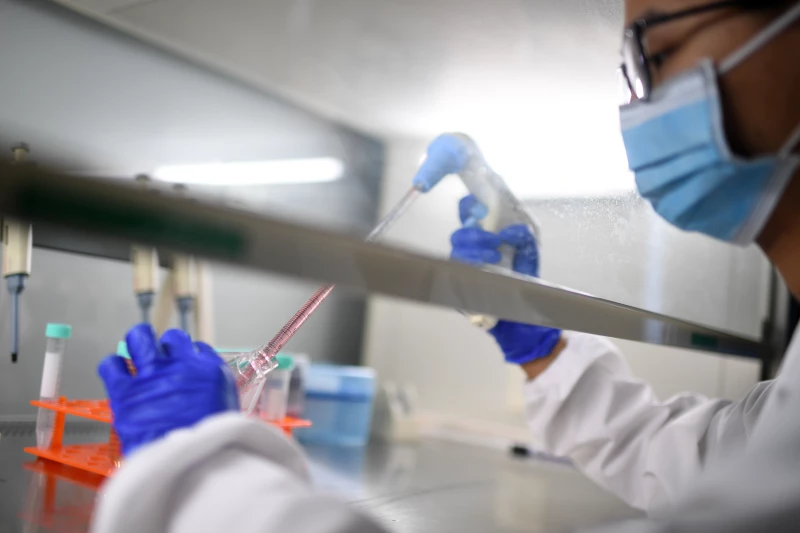The COVID-19 pandemic cost the U.S. economy $14 trillion, new research finds; Rubio COVID-19 report traces pandemic origins and Wuhan lab leak hypothesis, and other C-Virus related stories
The COVID-19 pandemic cost the U.S. economy $14 trillion, new research finds:
The big idea
The economic toll of the COVID-19 pandemic in the U.S. will reach $14 trillion by the end of 2023, our team of economists, public policy researchers and other experts have estimated.
Putting a price tag on all the pain, suffering and upheaval Americans and people around the world have experienced because of COVID-19 is, of course, hard to do. More than 1.1 million people have died as a result of COVID-19 in the U.S., and many more have been hospitalized or lost loved ones. Based on data from the first 30 months of the pandemic, we forecast the scale of total economic losses over a four-year period, from January 2020 to December 2023.
To come up with our estimates, our team used economic modeling to approximate the revenue lost due to mandatory business closures at the beginning of the pandemic. We also used modeling to assess the economic blows from the many changes in personal behavior that continued long after the lockdown orders were lifted – such as avoiding restaurants, theaters and other crowded places.
Workplace absences, and sales lost due to the cessation of brick-and-mortar retail shopping, air travel and public gatherings, contributed the most. At the height of the pandemic, in the second quarter of 2020, our survey indicates that international and domestic airline travel fell by nearly 60%, indoor dining by 65% and in-store shopping by 43%.
We found that the three sectors that lost the most ground during the first 30 months of the pandemic were air travel, dining, and health and social services, which contracted by 57.5%, 26.5% and 29.16%, respectively.
These losses were offset to a degree by surges in online purchases, a series of large fiscal stimulus and economic relief packages and an unprecedented expansion of the number of Americans working from home – and thus were able to keep doing jobs that might otherwise have been cut.
From 2020 to 2023, the cumulative net economic output of the United States will amount to about $103 trillion. Without the pandemic, the total of GDP over those four years would have been $117 trillion – nearly 14% higher in inflation-adjusted 2020 dollars, according to our analysis. —>READ MORE HERE
Rubio COVID-19 report traces pandemic origins and Wuhan lab leak hypothesis:
A 329-page report published by Sen. Marco Rubio (R-FL) on Wednesday examines the “political chronology” of the COVID-19 outbreak in China , intending to shine a light on operational problems at the Chinese state-run Wuhan Institute of Virology and the possibility of the coronavirus leaking from the lab.
The hypothesis that COVID-19 came from the state-run Wuhan lab has continued to be explored by federal lawmakers after the Energy Department determined with “low confidence” that a lab leak was the most likely origin of the disease. Rubio’s new report cites over 80 English and Chinese sources to trace how China’s government handled “biosecurity, biosafety, and public health” matters from 2018 to 2021 and engaged in an alleged “cover-up” of the deadly disease before it rippled across the world.
“As long as we approach the origin as an inherently scientific question to be answered solely by the methods of science, we empower the CCP to keep hiding the data that would most readily satisfy the evidentiary standards of science,” the report, which was obtained by the Washington Examiner, reads. “It is not the limits of science that constrain our understanding of the origin of SARS-CoV-2. It was the political decision to block scientists from accessing the clinical and genomic data that would have allowed them to methodically reconstruct what happened.
“For this reason, we approached the origin question as a political puzzle, first and foremost, with a scientific component that is important, but not decisively so,” the report adds. “This report borrowed a legal standard – the preponderance of the evidence — to assess what we know at this juncture, using the admittedly incomplete information we have available. Whatever its limitations, we trust that most readers will judge this report to be a useful contribution to the search for answers and accountability.”
Rubio’s report comes after the National Institutes of Health came under fire last week from Republican lawmakers when EcoHealth Alliance, a nonprofit group that received hundreds of thousands of dollars in federal grant money between 2014 and 2020, announced that the agency would resume its award. EcoHealth, which previously partnered with the Wuhan lab for coronavirus bat research, was informed by the NIH in 2020 that the grant would be suspended. —>READ MORE HERE
Follow links below to relevant/related stories and resources:
The Pandemic Didn’t Really Change How Americans Think About Sickness
NY nursing home COVID victim’s slams Andrew Cuomo in House hearing
USA TODAY: Coronavirus Updates
YAHOO NEWS: Coronavirus Live Updates
NEW YORK POST: Coronavirus The Latest







Comments are closed.